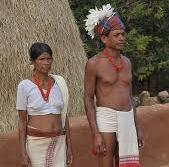Girls married to Gond bridegrooms in Madhya Pradesh’s Mandla district, will never ever end up as widows. According to their tradition, if a woman’s husband dies, she is married to the next bachelor in the family – regardless of age.
If there are no eligible boys, the village elders (usually a woman) will present the woman with specially designed silver bangles called ‘pato’ on the tenth day of her husband’s death. She is considered remarried and lives with the woman who offered her the the bangle.
Take the case of Patiram Warkhade’. His grandfather died when he was just six. On the ninth day of grandpa’s death, Patiram had to marry his own grandma, Chamri Bai, under the tradition of ‘naati (grandson) pato’.
“Later, we participated in all religious ceremonies as husband and wife. When I grew up, I married the girl of my choice because the community allows minors married under this system to remarry as adults,” 42-year-old Patiram, who lives in Behanga village, told a newspaper. His wife had the status of his ‘second wife’ till his grandmother died.
Decades ago, Sundaro Bai Kurwati, 75, married her brother-in-law, Sampat, who is 65. “My husband died two years after our wedding. The community elders refused to eat at his shraddh because my brother-in-law was initially reluctant to marry me. It was only after he agreed that the elders ate. We have been happily married for decades now,” Sundaro says.
Kripal Singh Warkhade (55) says he married his sister-in-law, Honsu Bai, who is five years elder to him. “It’s our tradition. Why should she remain a widow?” Kripal.
But a handful of women refuse to remarry. Like Bhagwati Warkhade, a 28-year-old and mother of two, whose husband died two years ago.”Though I didn’t want to remarry, I was given the status of a married woman under ‘panch pato’ tradition. The ‘panchs’ (village elders) have the power to do so,” Bhagwati says.
The Gonds uphold this practice even after moving out of their native village. “It’s alive even among the educated youth of our community. In a city like Bhopal, there are at least two engineers working with Bharat Heavy Electricals Limited who have married under devar pato,” tribal leader Gulzar Singh Markam said.
“It is so common in our culture that despite the fact that the marriage is only symbolic in case of ‘naati pato’, villagers playfully tease the child when they see him playing with the grandmother,” Gulzar says.
He may call it symbolic, but after ‘nati pato’, the grandson is considered head of the family.
The best thing would be to eliminate the word Widow. Why can’t we call the person ”single” if they lose their partner? Do we need tags?
[Prepared By Animesh Vats from media sources]



Clearly Vandana, the widow has a right to refuse! Read the ‘panch pato’. Actually these are dying traditions…
The thing is why this “panch pato” why cant she be alone without any tag.Its fine that its a dying tradition
I want to Know whether the men are also forced to remarry after the death of his wife.What I think the widow should not be forced to remarry, if they want to then its absolutely fine.But if you force the “Nati Pato” or anything like it then you ruin the relationship which is not at all correct. So it should be stoped.
There is no problem at all with the word ‘widow’.The problem is the cultural and religious baggage that the word carries in the traditional Hindu perception. Another problem that the use of the word ‘widower’ for men isn’t used by the Indian media!